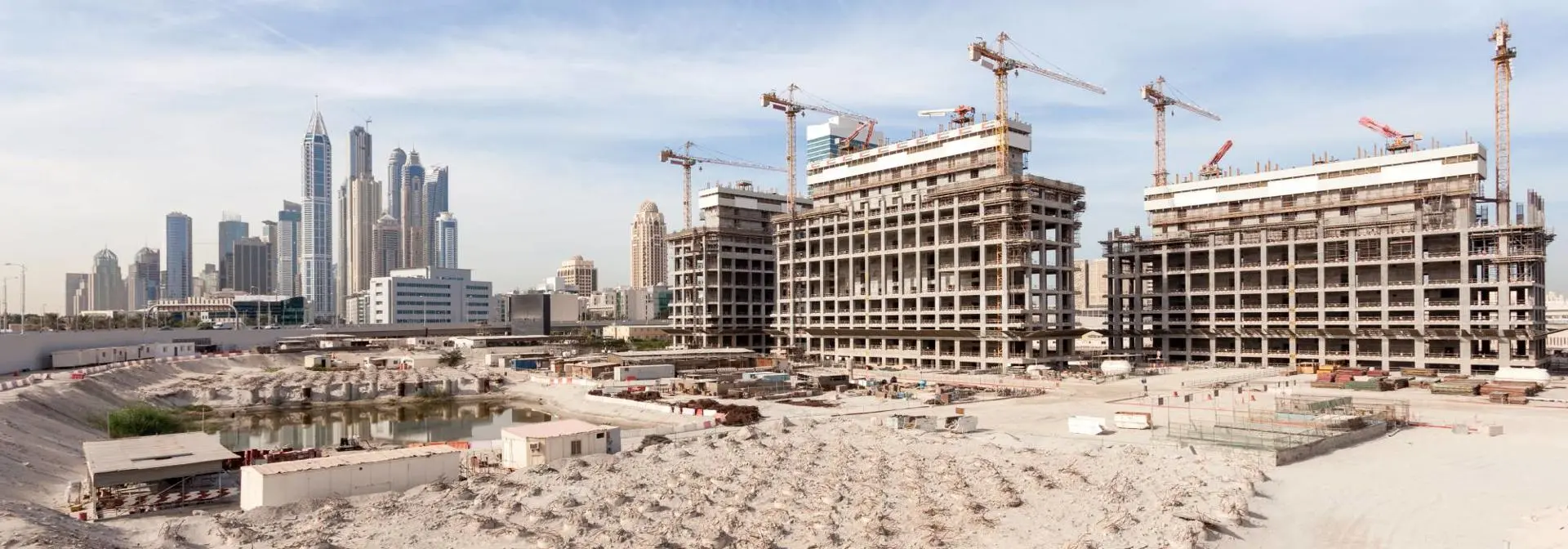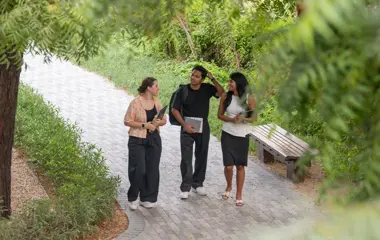Key information
The Engineering Doctorate (EngD) in Construction is an alternative to the traditional PhD to help you continue your career in industry.
- Funding
- Self-funded
- School
- Energy, Geoscience, Infrastructure and Society
- Location
- Dubai
- Award
- EngD
- Delivery type
- Full-time
- Supervisor
- Yasemin Neilsen
- Start date
- September, January, May
- Duration
- 4 years
The EngD is equivalent to a PhD in its intellectual challenge, but as a research engineer (EngD) student, your research will be industry-led and your project will involve your company as an industrial sponsor. This provides an unparalleled opportunity to gain experience working at the cutting-edge of research that is relevant to industry.
You will gain an in-depth understanding of the fundamentals of construction engineering management with the flexibility to tailor the technical and business training to the requirements of the company’s research area and your career aspirations.
The Engineering Doctorate (EngD) in Construction combines advanced technical and management training with PhD level research in partnership with an industry partner/sponsor. Research projects will be directly relevant to the strategic plans of your industry partner and cover a wide range of topics in the interrelated, and globally critical areas of construction and engineering.
EngD in Construction graduates will have generated new knowledge or improved business practice in areas of the construction sector relevant to their and their employers' interests and priorities. Research engineers undertaking the programme will have flexibility to tailor the technical and business management training to the requirements of their research area and to the business needs of their employer.
EngD students will benefit from the expertise and supervision of the academic staff and their industry sponsor. Research projects will be developed collaboratively by the academic supervisors and the research student in consultation with the sponsoring company. Sponsoring companies can range in size from SMEs to University spin-outs to multinational organisations.
Do students need an industrial partner to do EngD?
Yes, the EngD is an industrially embedded programme which benefits both the candidate and the sponsoring company.
Does the industrial supervisor need to have a PhD or EngD?
The industrial supervisor does not need to have a PhD or EngD, but they are expected to be an expert leader in the field.
What skills does an EngD provide?
An EngD provides a challenging, multi-disciplinary and academically rigorous education and training experience leading to a qualification equivalent to a PhD.
Is EngD qualification better than a PhD?
An EngD is essentially an engineering PhD with a solid industrial base and an additional taught element. Hence EngD is the same as PhD in terms of qualification but more industrially focused.
Can students continue their existing jobs as part of their EngD?
Yes, the idea is that students continue to work on a single or multiple projects to enhance their skills under the supervision of their industry and academic supervisors. Both the taught component and the project component will enable them to prepare for their thesis defence at the end of Year 4.
Do students get a stipend during the EngD programme?
A student/employee’s salary with their sponsoring employer will cover their expenses, though there will be no additional stipend paid to the candidate.
Who will hold the Intellectual property (IP) of the research?
IP generated is either shared equally between the RE, industrial sponsor, and Heriot-Watt University, or if the project is funded by the industry, the IP will be held by the sponsoring company. However, each case will have an individually tailored IP agreement. There will be a non-disclosure agreement (NDA) in place for commercially sensitive projects. This will ensure that both parties are protected. Details of the NDA can be discussed at the time of signing the contract.
Are students able to publish their work in journals/conferences?
Yes, with the consent of their employer/sponsor, students should be able to publish in academic journals and conferences. In some cases, the employer/sponsor may opt for a Patent if deemed feasible.
What areas of research can be expected to form part of EngD programme?
Heriot-Watt University has a range of expertise to suit the individual requirements of its candidates. The research project shall be placed in a business context taking full account of financial, environmental, social, and commercial considerations. Generally, research will be related to topics which improve efficiencies in the construction industry through:
- Reducing costs (construction project lifecycle costs)
- Reducing greenhouse emissions and the production of wastes
- Improving the health, safety and wellbeing of employees and community
- Smart Construction
- Sustainable Development
- Current trends and future opportunities
- Resilient cities
- Energy and water conservation
Must students wait for the new academic year in September to start their EngD?
Students can start in January, June or September throughout the academic year. However, the taught courses are only available during term time, which starts in September and January of each year. Hence, they will only have access to those courses which are being offered at the time of their EngD registration.
EngD programme content
The EngD is a four-year course and you would spend, on average, 80% of your time in industry and 20% at the University. The first two years will include taught courses delivered in the evenings for convenience in advanced technical areas relating to their research, combined with appropriate commercial skills training. In these early years the critical research skills will be developed through taught courses and research project work. Year’s three to four are wholly spent conducting applied research, with the opportunity to gain valuable industry and commercial experience with the sponsoring company and an ongoing programme of commercial skills development.
In the first two years of the EngD in Construction the student would complete the equivalent of a part-time PGDip or MSc. Throughout the 4 years of study, the student will engage in one of more research projects, relevant to their employer and aligned to a central thesis.
The required taught component uses courses at SCQF level 11 with 120 credits in total. The students on the proposed EngD in Construction programme will have the option to choose from a number of relevant courses currently available to cater for their individual needs and career aspirations.
- Year 1: 60 credits (4 x SCQF Level 11 Courses), Progress Report on Research project(s);
- Year 2: 60 credits (4 x SCQF Level 11 Courses), Progress Report on Research Project(s)
- Year 3: Progress Report on research project(s)
- Year 4: EngD. Thesis or Portfolio;
Course choice
A list of the current courses is summarized below.
Semester 1
- D11ST- Sustainability for Construction Professionals
- D31CF- Quantity Surveying Financial Management
- D31PT- Project Management Theory and Practice
- D31VR-Value and Risk Management
- D41VC- Real Estate Appraisal and Valuation
- D21EH- Environmental Hydrology & Water Resources
- D31AT - Advanced Construction Technology
- D41EP- Urban Economy and Property Markets
- D31SC- Strategic Commercial and Contracts Management
- C11DG- Digital Business Strategy: Platforms and Ecosystems
- D31SQ- Service Procurement and Provision
- D41SP- Spatial Planning
- C11BA- Business Analytics
Semester 2
- D21FE- Foundation Engineering
- D21WW- Water and Wastewater Treatment
- D31AM- Strategic Asset maintenance management
- D31CG- Construction Financial Management
- D31PO- People and Organization Management in the BE
- D31SM- Space Planning and Management
- D21SB- Design and Analysis of Tall Steel Buildings
- D21WA- Water Supply System Analysis
- D31MI- Construction Practice and Information Technology
- B51GI Technology Future and Business Strategy
- F21DE Digital and Knowledge Economy
- D31RZ-Research Dissertation
- D31PS- Project Management Strategic Issues
- D31RZ course is only available to students pursuing MSc exit qualification
In addition, students registered will attend workshops and seminars for the PhD cohort, and specialist seminars geared towards business development and entrepreneurship.
Accreditation
All graduates receive a British degree that is accredited by Royal Charter in the UK.
This programme is accredited by the Ministry of Higher Education and Scientific Research in the UAE.
Project supervisor

Entry requirements
Candidate criteria
This programme will admit graduates from degrees relevant to the construction engineering and management. The EngD qualification at Dubai will cater for potential candidates who are currently embedded in industry, or to facilitate knowledge transfer from Heriot-Watt to industry with a new recruit.
If you have any questions about the application process, contact Dr. Yasemin Nielsen (yasemin.nielsen@hw.ac.uk).
English language requirements
If your first language is not English, we'll need to see evidence of your English language ability.
The minimum English language requirement for entry to this programme is IELTS 6.5 (or equivalent) with no score lower than 6.0.
If you do not have IELTS 6.5, we offer a range of English language courses to help you meet the English language requirement for this programme prior to commencing your studies.
For more information about your application and our English Language requirements, please see Section 10 of our page on English Language Requirements as part of your application.
Funding information
| Full Time | |
|---|---|
| Local and International | AED 65,676 per year |
- All tuition fees inclusive of VAT.
Additional information
Scholarships and bursaries
See our range of degree entry, undergraduate, postgraduate taught and PhD scholarships and discounts.
We offer a number of competitive funded scholarships for research degrees. Full or partial support may be available for well-qualified candidates from UK research councils, research pools, charities or industry.
View our full range of scholarships.
Why Heriot-Watt
As the first British university to set up a campus in Dubai in 2005, we have established ourselves as a pioneer in the higher education market in the UAE. The three consecutive five-star ratings by the Knowledge and Human Development Authority (KHDA) is a testament to our reputation for world-class teaching.
The futuristic Dubai campus is designed to offer interactive and collaborative learning experiences with innovative classroom styles fostering group work and engagement like Collaborative lecture theatres, Digitally Classrooms and Seminar rooms. The campus also has dedicated cutting-edge laboratories and workshops that span various engineering disciplines along with Psychology, IT, Photography, Design and Architecture.
Our practical, leading-edge research combined with strong links to business and industry, have made our graduates highly employable and sought after by the best organisations worldwide, with over 90% in graduate-level jobs or further study within six months of graduation. On top of that, we have beautiful campuses, across the globe, so you'll get a truly international education through our Go Global programme.

